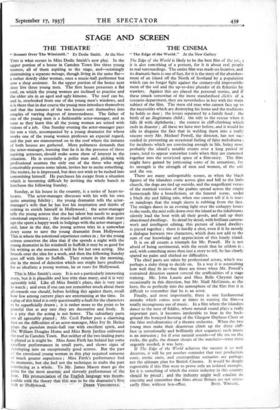THE CINEMA
" The Edge of the World." At the New Gallery
The Edge of the World is likely to be the best film of the ; it is also something of a portent, for it is about real people in real surroundings. The entire film was made on location, and its dramatic basis is one of fact, for it is the story of the abandon- ment of an island off the North of Scotland by a population which can no longer fight against the century-old impoverish- ment of the soil and the up-to-date plunder of its fisheries by trawlers. Against this are played the personal stories, and if these smack somewhat of the more standardised cliches of a scenario department, they are nevertheless in key with the main subject of the film. The stern old man who cannot face up to the necessities which are destroying his home and the traditions he holds so dear ; the lovers separated by a family feud ; the birth of an illegitimate child ; the ride to the rescue when it falls ill with diphtheria ; the contest in cliff-climbing which ends in disaster ; all these we have met before, and it would be idle to disguise the fact that in welding them into a really, sincere story Mr. Michael Powell, the director, has not suc- ceeded in preventing an occasional feeling of false melodrama ; for incidents which are convincing enough in life, being most probably the island's notable events over a long period of years, tend to appear somewhat voulu when they are crammed together into the restricted space of a film-story. The film might have gained by jettisoning some of its sensations, for its strength is the strength of men and women, of the soil and the sea.
There are many unforgettable scenes, as when the black figures of the islanders come across glen and hill to the little church, the dogs are tied up outside, and the magnificent verses of the metrical version of the psalms spread across the empty homesteads like a benediction; or the funeral scene, under a black sky and falling rain, when one cannot tell if it is tears or raindrops that the rough sleeve is rubbing from the face. The midges dance in an evening light over the unhappy lovers in the reeds, the mist rolls down over the island as the inhabitants silently load the boat with all their goods, and nail up their abandoned dwellings. So detail by detail, with brilliant camera- work and intelligent editing, this picture of island dwellers is pieced together ; there is hardly a shot, even if it be merely a dialogue between two characters, which does not add to the sum of our knowledge and appreciation of this lonely island.
It is on all counts a triumph for Mr. Powell. He is not afraid of being sentimental, with the result that he seldom is ; and, with something more than just a story to tell, he has clearly spared no pains and shirked no difficulties.
The chief parts are taken by professional actors, which was perhaps a risky thing to decide on. In a way it is astonishing how well they fit in—but there are times when Mr. Powell's restrained direction cannot conceal the artificialities of a stage training. Mr. John Laurie and Miss Belle Chrystal lapse occasionally in this direction, but Mr. Niall McGinnis, as the, hero, fits so perfectly into the atmosphere of the film that it is difficult to remember that he is an actor.
Finally, and most importantly, there is one fundamental mistake which comes near at times to ruining the film—a totally incongruous use of music. -In a film where the islanders dance to the tune of fiddles, where natural sound plays a really important part, it becomes intolerable to hear in the back- ground, the honeyed keening of the Glasgow Orpheus Choir or the false melodramatics of a theatre orchestra. When the two young men make their disastrous climb up the dizzy cliff- face (a sensationally and brilliantly shot sequence) such music is an intrusion ; for if ever natural sounds—of the sea on the rocks, the gulls, the distant shouts of the watchers—were most urgently needed, it was here. If The Edge of the World achieves the success it so well deserves, it will be yet another reminder that vast production costs, exotic casts, and cosmopolitan scenarios arc perhaps not the ultimate plan for British Cinema. It would be deeply regrettable if this film were to prove only an isolated example, for it is something of which the entire industry in this country should be proud ; and the industry might well emulate its sincerity and remember that films about Britain arc not neces-










































 Previous page
Previous page